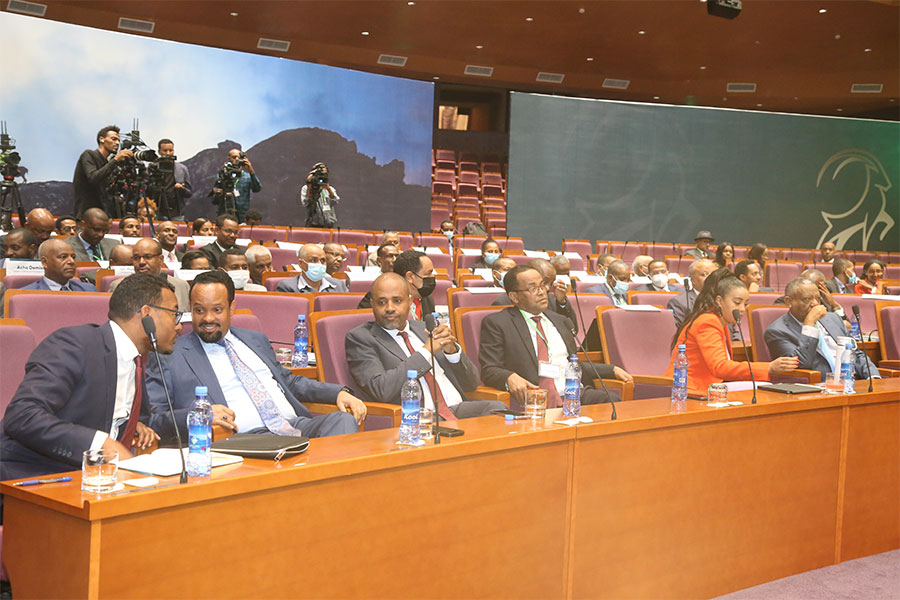
Jun 20 , 2020
By Dawit Wondimagegn
Despite having competent individuals in the country, there is a lack of involvement from such professionals in taking up public service positions. The most significant reason for this is the over-politicisation of public service, but there also is the dereliction of the educated elite toward public service, writes Dawit Wondimagegn (MD) (dawitwondimagegn@gmail.com), associate professor of psychiatry at Addis Abeba University’s School of Medicine and chief executive director of TikurAnbessa Hospital.
One of the factors crippling progress in Ethiopia is the lack of involvement from the educated elite in public service. Most citizens live their lives in relative seclusion from active public discourse in general and politics in particular. Matters of the political and public service are left to a few educated or self-proclaimed elites, and the public tends to be swayed by attitudes and behaviours of a select few. The assumption is that they know what they are doing.
A closer look at these groups of individuals who are trusted with the responsibility of governing the routine, mundane and monotonous aspects of public life indicates that most public services are governed by people who lack competence, experience or credentials that are befitting of the offices they run. Even though there have been recent attempts to right this wrong, incompetence remains one of the most important challenges of governing public services in Ethiopia.
Despite having competent individuals in the country, why is there such a lack of involvement from such professionals in taking up public service positions?
The most significant reason is the over-politicisation of public service. However, professionals themselves are not exempted from accountability by shying away from taking up such responsibilities and leaving the space open for well-meaning but mostly self-interested individuals.
Inaction, indifference and silence by professionals have contributed to the lack of depth and ownership in public service and for the overwhelming manifestation of incompetence and disorganisation we see in most of our institutions.
In the face of the system's paralysis, citing all sorts of excuses, albeit misguidedly, we have assumed that it will not affect us. By staying inactive, we forget that we are permitting an epidemic of incompetence to invade our institutions. Now we are left to lament daily challenges that affect everybody.
Some of us have opted to be indifferent. This is probably the most difficult one to understand. Most highly educated Ethiopians are supposed to be grateful for the opportunity given to them to make it to the top in their respective disciplines, as many, almost all, are products of good public service in every possible way. It is hard to understand how such individuals opted to turn a blind eye to the problems when the very same institutions that made them have slowly disappeared into non-recognition. It is one thing to act and fail or to make a mistake, but it is a sin beyond redemption to completely remain indifferent when the very existence of our public service institutions is threatened.
Some of us continue to opt to be silent. We live in the land of "silent wise men [and women]," a reference to our forbearers who walked and worked the land with the wisdom to know when silence is required. However, keeping silent when a voice is needed to correct a wrong is the height of self-deception. Most of us opted for silence when a below-mediocre polity hijacked our public service institutions. Whatever their motives, they saw an opportunity and took it.
We hear most privileged individuals complaining about the quality and standard of services provided to them, expecting a level of treatment they believe they are entitled to. But if one wants such treatment, the only way to get it is by getting involved, by taking up the responsibilities that they shy away from through inaction, indifference and silence.
An established piece of gambler's wisdom is that one does not count their gains or losses in the middle of the game but waits until the end. Unfortunately, this does not work when the stakes are high, and the fate of a nation is hanging in the balance.
Most of us are hung up on political discourse as the most critical factor that determines where a nation goes, and there is truth to that. We should worry about our politics and engage with the process as much as it is relevant to us as individuals and members of various communities. The problem with this approach is that, almost always, our engagement with political discourse seems to be suspended from the realities of daily life.
The educated elite of our country has to accept that we need to take on multiple burdens of responsibility. Thus far, we seem to have settled for one of three positions: innocent bystanders, revolutionaries and victims of circumstances.
The innocent bystanders are those who claim that their role is unique and defined, and they cannot do anything else. Excessive and endless needs characterise them. If they had this and that, and if somebody, most of the time the government, had done this and that, they could have contributed. Otherwise, they believe, all they can do is stand by. They do not see themselves as part of a whole but an important component of it if only they were recognised as such and their needs were fulfilled.
A lot is said about the revolutionaries. The thousands of educated Ethiopian revolutionaries from all sides of the political aisle deserve our respect. Still, there is a segment of them whose whole idea of change is defined by passive aggression. These are people who either are not engaged in a formal struggle for change or do not believe they are in a place that needs changing. That change starts at home by doing what is expected of us. They stay in the fantasy world that will come one day as long as they stay alive waiting for it.
Self-declared victims of circumstances are the most interesting batch, both psychologically and gossip-wise. These are people who play their role very carefully; most have left the country because of supposedly difficult circumstances. They feel they can dictate how the rest of us live from the comfort of their homes by remote control.
They claim ownership to knowledge as to how a country runs with no recognition that they are only projecting their guilt. They are characterised by a willful refusal to know that the reality is different here. They have developed quite a following locally by misrepresenting reality for the restless youth. Symbolically and literally they are far away from here.
This is not a critique of any individual as pointed out above, but educated Ethiopians need to understand that we cannot keep on shying away from what is relevant and expect progress in any form or shape. Our future and the future of our children lies in how much we accept the challenges of our time and make the necessary sacrifice for a better tomorrow.
Public service is where we are needed; in every public institution, there is a space crying out for quality. All it needs is our willingness to take up one more responsibility to make things better so that we win the bet! There is so much good to be gained from committed public service, even if the job sounds less professional. Where we help our nation is by saving its public service. The rest is a mirage!
PUBLISHED ON
Jun 20,2020 [ VOL
21 , NO
1051]


Sunday with Eden | Apr 08,2023

Radar | Jun 12,2023

Commentaries | Oct 07,2023

View From Arada | Sep 23,2023

Fortune News | Jun 25,2022

Fortune News | Jan 18,2020

View From Arada | Mar 26,2022

Radar | May 31,2025

Life Matters | Nov 27,2021

Radar | Mar 26,2022

My Opinion | 131451 Views | Aug 14,2021

My Opinion | 127803 Views | Aug 21,2021

My Opinion | 125783 Views | Sep 10,2021

My Opinion | 123419 Views | Aug 07,2021

Dec 22 , 2024 . By TIZITA SHEWAFERAW
Charged with transforming colossal state-owned enterprises into modern and competitiv...

Aug 18 , 2024 . By AKSAH ITALO
Although predictable Yonas Zerihun's job in the ride-hailing service is not immune to...

Jul 28 , 2024 . By TIZITA SHEWAFERAW
Unhabitual, perhaps too many, Samuel Gebreyohannes, 38, used to occasionally enjoy a couple of beers at breakfast. However, he recently swit...

Jul 13 , 2024 . By AKSAH ITALO
Investors who rely on tractors, trucks, and field vehicles for commuting, transporting commodities, and f...

Jun 28 , 2025
Meseret Damtie, the assertive auditor general, has never been shy about naming names...

Jun 21 , 2025
A well-worn adage says, “Budget is not destiny, but it is direction.” Examining t...

Jun 14 , 2025
Yet again, the Horn of Africa is bracing for trouble. A region already frayed by wars...

Jun 7 , 2025
Few promises shine brighter in Addis Abeba than the pledge of a roof for every family...

Jun 29 , 2025
Addis Abeba's first rains have coincided with a sweeping rise in private school tuition, prompting the city's education...

Jun 29 , 2025 . By BEZAWIT HULUAGER
Central Bank Governor Mamo Mihretu claimed a bold reconfiguration of monetary policy...

Jun 29 , 2025 . By BEZAWIT HULUAGER
The federal government is betting on a sweeping overhaul of the driver licensing regi...

Jun 29 , 2025 . By NAHOM AYELE
Gadaa Bank has listed 1.2 million shares on the Ethiopian Securities Exchange (ESX),...